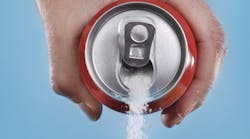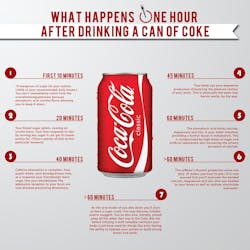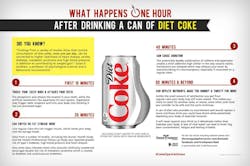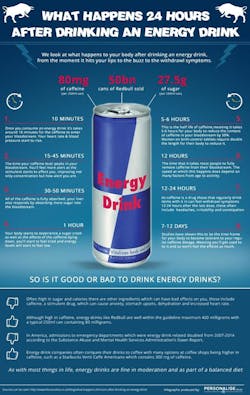This article originally appeared in RDH eVillage Focus, a newsletter prepared for dental professionals looking for hard-hitting, current information. You can subscribe here.
TheRenegade Pharmacist has some interesting ideas of what soft drinks do to one’s body. This article will share some of those thoughts with you, and discuss some research published in scientific journals.
In its coverage of The Renegade Pharmacist’s infographics, which went viral, The New York Daily News wrote, “the beverage wreaks havoc on the body, according to the graphic, releasing an excess of dopamine and leaving the individual dehydrated, sluggish, irritable and craving more.” (1) The infographic mentions the drink’s ten teaspoons of sugar, and the phosphoric acid, which is added to make the sweetness more appealing.
READ MORE |The sugar industry’s influence on dental research
And for those that think diet is better, think again. Another infographic on The Renegade Pharmacist states “within the first 20 minutes of consuming a can of diet soda, your teeth's enamel is attacked and your body releases insulin, which causes the body to store fat.” (2) The infographic talks about the dangers to the teeth, the dangers of aspartame, and that even one diet soft drink per day can cause bodily harm.
After these infographics went viral, another similar image outlining how energy drinks affect the body surfaced. The New York Daily News reported that “within 10 minutes, the graphic says, heart and blood pressure spike. Within 15 to 45 minutes, you’ll feel the most alert. But the beverage’s 27 grams of sugar head to the bloodstream, setting customers up for a crash.” (3)
Scientific journals
These concerns about the effects of soda extend to more clinical publications. (4) A meta-analysis published in TheBMJ found that sweetened beverage consumption, whether artificially sweetened or not, seems to increase the risk of diabetes. The authors pointed out that this risk might be independent of obesity and suggestive of different pathways. (4)
Apparently there wasn't adequate information to determine anything conclusive about fruit juice: “Fruit juice was defined as 100% fruit juice or otherwise as a fruit-based beverage explicitly distinguished from sweetened fruit-flavor drinks,” according to the authors, Imamura et al. None of the studies in the meta-analysis examined subtypes of sugar or artificially sweetened drinks or fruit juice. (4)
READ MORE |Help Dental Patients Manage Sugar With An App
Imamura and his research group determined that soft drinks might contribute to nearly 2 million diabetes cases in the United States and the United Kingdom over 10 years. "But this estimate is under assumption that everyone had the same weight," he wrote. "If we consider that soft drink consumption contributes to weight gain, the estimate should be higher." (4)
There were some criticisms of the study. One response stated that they were “ disappointed with the use of the terms “causality” and “compelling evidence” given that the research examined by Imamura et al. were observational studies; this type of investigation produces very “low quality evidence.” (5) Others criticized that “one needs to be cautious in drawing conclusion based on extracting information from existing studies and statistical analyses in such a way that a causal relationship is established between a dietary habit and a disorder.” (5) You decide.
READ MORE |Is sugar toxic? Some of the latest news for those with a sweet tooth
Shortened telomeres, shortened lifespan?
Keep in mind that researchers at the University of California, San Francisco (UCSF) found that sugar-sweetened soda consumption might promote disease independently from its role in obesity, as drinking sugary drinks was associated with cell aging. (6) The study revealed that telomeres, the protective units of DNA that cap the ends of chromosomes in cells, were shorter in the white blood cells of survey participants who reported drinking more soda. (7) The length of telomeres within white blood cells has been connected to human lifespan. Short telomeres have been associated with the development of chronic diseases of aging, including heart disease, diabetes and some types of cancer. (6) The authors caution that, even though telomere shortening has previously been associated with oxidative damage to tissue, inflammation, and insulin resistance, that an association does not demonstrate causation. (7)
And lastly, a new article stresses importance of sugars as a cause of caries, and that its role is minimized and not highlighted in preventive strategies. (8) The authors state that the “only cause of caries is dietary sugars”. (8) The researchers state that long-term failure to recognize the necessity for severe national reductions in sugars intakes reveals scientific confusion partly encouraged by pressure from major industrial sugar interests. (8) In their opinion, caries is a diet-mediated disease.
References
1. AFP RELAXNEWS, Engle M. Here's what happens to your body an hour after you drink Coke. The New York Daily News. http://www.nydailynews.com/life-style/health/body-hour-drink-coke-article-1.2309345. Published July 30, 2015. Accessed September 1, 2015.
2. Diet Coke Exposed: What Happens One Hour After Drinking Diet Coke, Coke Zero or Any Other Similar Diet Soda. The Renegade Pharmacist. http://therenegadepharmacist.com/diet-coke-exposed-happens-one-hour-drinking-diet-coke-coke-zero-similar-diet-soda/. Published August 2, 2015. Accessed September 1, 2015.
3. Engel M. What happens to your body an hour after guzzling an energy drink? The New York Daily News. http://www.nydailynews.com/life-style/health/body-guzzling-energy-drink-article-1.2325179. Published August 13, 2015. Accessed September 1, 2015.
4. Imamura F, O’Connor L, Ye Z, et al. Consumption of sugar sweetened beverages, artificially sweetened beverages, and fruit juice and incidence of type 2 diabetes: systematic review, meta-analysis, and estimation of population attributable fraction. BMJ. 2015;351:h356 DOI:10.1136/bmj.h3576.
5. Archer E. Letter to the editor: Evidence for Sugary Beverages and Diabetes Link is not so Sweet, Compelling or even Plausible. The BMJ. http://www.bmj.com/content/351/bmj.h3576/rapid-responses. Published August 11, 2015. Accessed September 1, 2015.
6. Norris J. Sugared Soda Consumption, Cell Aging Associated in New Study. Universityof California San Francisco. http://www.ucsf.edu/news/2014/10/119431/sugared-soda-consumption-cell-aging-associated-new-study. Published October 16, 2014. Accessed September 1, 2015.
7. Leung CW, Laraia BA, Needham BL, et al. Soda and Cell Aging: Associations Between Sugar-Sweetened Beverage Consumption and Leukocyte Telomere Length in Healthy Adults From the National Health and Nutrition Examination Surveys. Am J Public Health. 2015;104:2425-2431.
8. Sheiham A and James WPT. Diet and Dental Caries: The Pivotal Role of Free Sugars Reemphasized [published online August 10, 2015]. J Dent Res. doi: 10.1177/0022034515590377.










